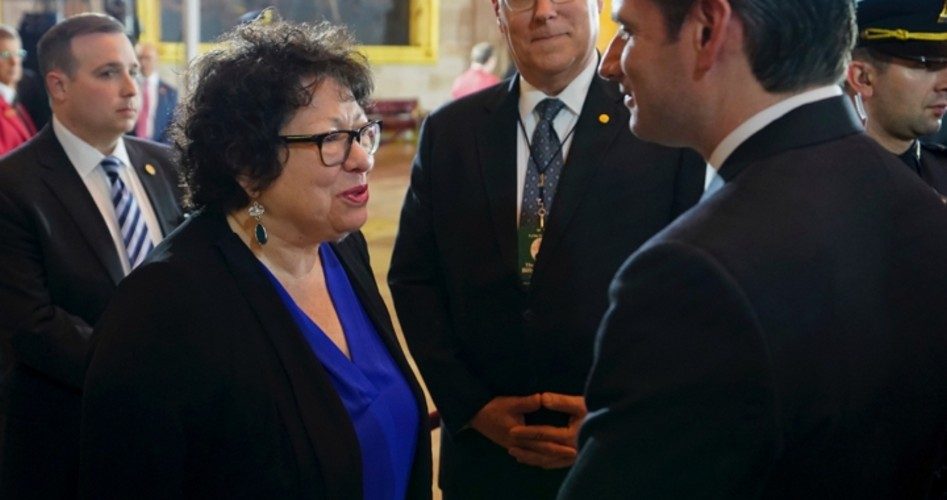
Justice Sonya Sotomayor, the radical jurist who worked for La Raza, once called herself “an affirmative action baby.” Many would say this is an apt description, too, since she has been “explicit that she values feelings over law,” as a commentator recently put it — which means she doesn’t know her job.
The latest example is a scathing dissent she issued Friday in which she slammed her more Constitution-oriented colleagues for allegedly favoring the federal government over other litigants; moreover, since the executive branch is currently run by President Trump, many interpret this as an accusation of pro-Trump bias.
In response, President Trump stated while on his trip in India this week that Sotomayor, along with Justice Ruth Bader Ginsburg, should recuse themselves in cases relating to him because of their bias.
The opinion raising Sotomayor’s ire concerned Wolf v. Cook County and allowed the government to deny green cards to foreigners on the government dole. While this policy is just common sense and accords with historical American norms, Sotomayor and her confederates consider it a “‘wealth test’ for legal immigrants,” as the Independent Sentinel puts it. (Newsflash: There’s supposed to be a “wealth test” for immigrants. Or is the United States obligated to be the world’s flophouse and soup kitchen?)
{modulepos inner_text_ad}
Sotomayor was particularly upset, however, over the SCOTUS’s frequent staying of injunctions constraining the Trump administration. She believes these injunctions should be respected because issuing them has long been the norm, even though the Constitution explicitly grants judges no such sweeping power over the executive branch.
As for Trump’s accusation, in reality, everyone has a bias. Almost universally missed regarding this in general, however, is the only relevant issue: whether one is biased in favor of the Truth or a lie. And as for justices’ execution of their duties, the only question is whether they’re biased in favor of the Constitution or something else.
Unfortunately, Sotomayor has made clear that not only is she a “something else” affirmative-action baby, but that she embraces an infantile philosophy denying the existence of Truth itself.
To understand how the justice could be so wrong on the Wolf case and many others, you need only examine her basic worldview. Relevant here is a 2009 speech Sotomayor gave in which she stated that as a jurist she subordinated constitutional principles to “life experiences” (hers, coincidentally). She stated:
Justice O’Connor has often been cited as saying that a wise old man and wise old woman will reach the same conclusion in deciding cases. I am not so sure Justice O’Connor is the author of that line since Professor Resnik attributes that line to Supreme Court Justice Coyle. I am also not so sure that I agree with the statement. First, as Professor Martha Minnow has noted, there can never be a universal definition of wise. Second, I would hope that a wise Latina woman with the richness of her experiences would more often than not reach a better conclusion than a white male who hasn’t lived that life.
(Hat tip: American Thinker.)
Sotomayor is certainly right — to not be sure (being wrong has a way of shaking confidence). First, she manages to implicitly contradict herself within the space of two sentences. After stating there’s no universal definition of “wise,” she immediately touts the benefits of being a “wise” Latina. But how is this modifier at all relevant if it represents a relative notion?
In reality, “wisdom” is like “beauty” (which I also wrote about recently): Unless referencing something universal, transcendent, and unchanging, it then is simply a water-muddying synonym for preference.
Yet wisdom does have a universal definition. This was more often expressed in the days when dictionary writers possessed greater philosophical acumen, but is nonetheless related even today at Dictionary.com: “knowledge of what is true or right coupled with just judgment as to action.”
Now, Sotomayor and the character she quotes (Minnow) don’t believe in a universal definition of “wise” because they don’t believe in a universal definition of “right” — because they’re relativists. This brings us to the judge’s main contradiction.
A synonym for “right” is “good,” and “better” is the comparative form of “good.” So in Sotomayor’s relativistic universe, since “better” has no universal to be compared to, it’s an incomprehensible concept and, therefore, meaningless. So why does she assert that “a wise Latina woman … would more often than not reach a better conclusion than a white male”? “Better” relative to what — preferences she cherishes and would impose on others?
The answer is that Sotomayor is another mushy-headed modern who, operating on emotion, makes it up as she goes along and just says whatever feels right. This breeds contradiction because emotion changes with the wind.
This philosophical juvenility is the real reason Sotomayor’s decisions are so poor. Just as a tree with rotten roots won’t have good leaves or fruit, getting fundamental things wrong leads to frequent error in everything else.
It’s not surprising that Sotomayor and other leftist “jurists” interpret the Constitution relative to the times (as defined by them). After all, they believe that the only thing of substance it could be based on, Truth, is relative itself. Thus do they make everything relative to what they love most: themselves.
Photo: AP Images
Selwyn Duke (@SelwynDuke) has written for The New American for more than a decade. He has also written for The Hill, Observer, The American Conservative, WorldNetDaily, American Thinker, and many other print and online publications. In addition, he has contributed to college textbooks published by Gale-Cengage Learning, has appeared on television, and is a frequent guest on radio.



